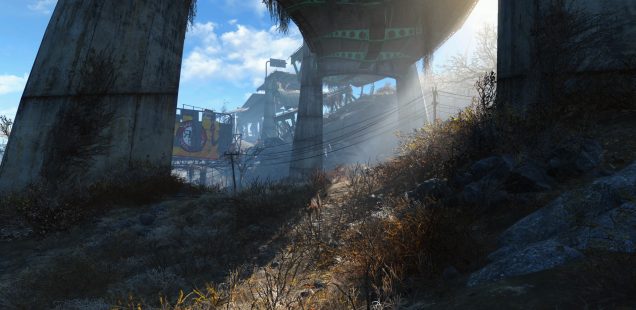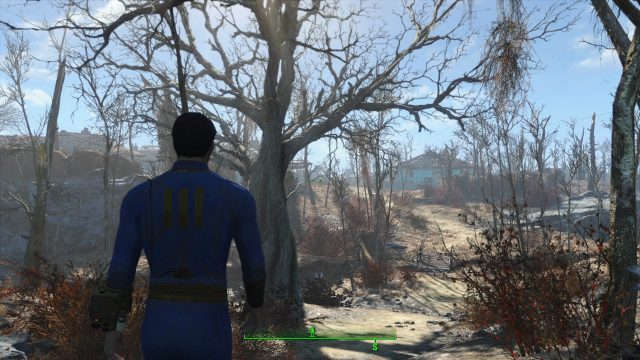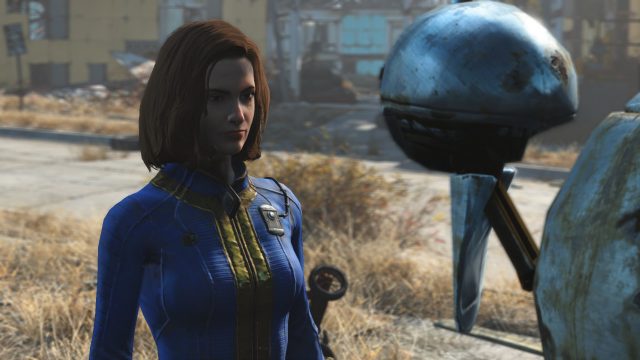
Fallout 4 and the Sublime
Justin Keever is navigating the illusory infinity of the Commonwealth.
There’s a widespread discontent that’s spread through a fair number of critics and fans of the Fallout series in the weeks following Fallout 4’s release. All parties have come to more or less the same conclusion: Fallout 4 is not a Fallout game. It lacks the same sensibilities as Interplay’s original isometric games or Obsidian’s New Vegas: the democratization of play that largely defines the pen-and-paper tradition that led to modern Western RPGs. There’s a pervading sense that as Fallout forgets its elders by chasing the same zeitgeist that’s defined blockbuster videogames for the last several years, the stat-based roleplaying niche has now been forcefully carved out of the mainstream. Some writers have managed to wring some enjoyment out of the game despite this perceived loss: Patricia Hernandez points to a pleasurable focus on “adventure, discovery, and combat” (an observation mirrored by Andy Kelly), and Chris Franklin cites how Fallout 4’s open “wandering simulator” structure allows for a kind of player expression independent of typical role-playing considerations.
These writers are gesturing towards something interesting: something Fallout 4 does extraordinarily well that they try to pinpoint, but ultimately misrepresent. In their writing, there’s an implicit emphasis in the game’s capacity to facilitate emergent narratives, through an open structure and an ill-defined ‘sense of discovery.’ I take issue with this summation of the game’s appeal, simply because I find emergent narratives largely uninteresting: more often than not, the tales that action games let us craft amount to little more than “I went here and killed one-to-several people.” The affordances of an action game rarely allow for any sort of fundamentally interesting self-expression.
What we can take from these pieces is the (rather obvious) importance of the relationship between the player and the game environment. This supposed emphasis on expressive discovery places the player in the dominant role in this relationship: the open environment bends to fit our linear experience and the order of pre-authored narrative fragments. This is the archetypal open world power fantasy: go where you want, kill who you want.
This idea of “emergent narrative as power fantasy” is a combination of Jenkins’ original concept of emergent narrative and Ian Bogost’s sensation of videogame “transit.” What Bogost is referring to is how videogames offer a kind of revitalization of the experience of “space between points.” Games give us a space, Bogost says, to recapture that lost sense of autonomy in travel, the tangible effort it once took to move from one place to another, and “the necessary unfamiliarity” of pre-railroad travel. As Bogost notes, “Before the railroad, the traveler also doubled as adventurer, taming the spaces in between destinations by passing through them, both literally via foot or horse or carriage and figuratively by vision and judgment.” That’s Fallout 4 in a nutshell: discovery of the unfamiliar through real effort and autonomous movement, which in turn generates a sense of adventure.
However, this notion of expressive discovery and emergent narrative is problematic. It focuses too heavily on the basic outcome of traversing space, not on the experience itself. The player/space relationship as Franklin, Hernandez, and Kelly describe it is one-sided, a story of a space bending itself to the meet the player. This characterization discounts how the environment acts upon the player – how transit in Fallout 4 actually feels. The moments between discovering new locations or levelling up are not empowering. Raiders appear from buildings you thought were empty when you saw them in the distance. Ghouls lie in wait beneath abandoned train cars, unseen until they announce they’ve been roused from their slumber with a startling growl. Mole rats and Mirelurks emerge from the soil itself. Turn a corner downtown, and stumble into a settlement of Super Mutants. And these things will kill you, again and again. Fallout 4 is not a game about exacting your strength on the environment, just the opposite.
And yet, despite an intensified focus on combat, the action in the latest Fallout is intermittent at most. The experience of play is marked by extended periods of quietude, a kind of contemplative silence that is nevertheless tense, inflected with a perpetual feeling of danger. It’s that tension, that enduring unease, which makes Fallout 4 so delightful. When Franklin accusatorily claims that the latest Fallout is “less cerebral” than the systems-focused isometric games, he accidentally gets at something interesting: the appeal of Bethesda’s latest lies beneath theme and strictly intellectual engagement. The appeal of the new Fallout lies in pure emotional response, the recasting of a negative tension as pure pleasure. It is sublime.
 Although here, the term “sublime” is somewhat indeterminate on its own: its definition has changed as various philosophers and thinkers reconsider the term in the context of their respective periods, so I’ll simply clarify that I’m referring to the sublime as it was explained by Edmund Burke in his 1757 treatise A Philosophical Enquiry into the Origin of Our Ideas of the Sublime and Beautiful. Burke’s conception of the sublime is a fundamentally simple one. Essentially, that which is terrible, that is, something which threatens pain or death, can be delightful to experience if it is presented “at certain distances, and with certain modifications” so that no real harm is done. If we are able to survive an encounter with a terrible thing, we are able to appreciate the grandeur of the thing we encountered.
Although here, the term “sublime” is somewhat indeterminate on its own: its definition has changed as various philosophers and thinkers reconsider the term in the context of their respective periods, so I’ll simply clarify that I’m referring to the sublime as it was explained by Edmund Burke in his 1757 treatise A Philosophical Enquiry into the Origin of Our Ideas of the Sublime and Beautiful. Burke’s conception of the sublime is a fundamentally simple one. Essentially, that which is terrible, that is, something which threatens pain or death, can be delightful to experience if it is presented “at certain distances, and with certain modifications” so that no real harm is done. If we are able to survive an encounter with a terrible thing, we are able to appreciate the grandeur of the thing we encountered.
There’s a certain dubiousness to claiming that a work of art is able to truly evoke feelings of the sublime: Kant argued that the sublime is the realm of nature and nature alone, and Burke himself argued that images are largely unable to evoke feelings of true pleasurable terror due to their inherent limits: all paintings, after all, are contained by their frames.
For the sake of argument, let’s keep that caveat in the back of our minds and assume that art is capable of creating sublime sensations. Action games, specifically, are built around the basic desire to stay alive. The fighting and killing is often optional, in a sense: you can play Doom just running from room to room, keycard to keycard; when you defend a point in Call of Duty, you kill only because that makes it easier to live. These experiences are often stressful, even intense, but there’s no threat of direct harm to the player; maybe a bit of vibration amidst the fingers, a bit of red on a screen. But through the sheer power of investment, be it in the characters, items, or the time we spend, we feel that drive to preserve the self, or a surrogate self at the very least.
Of course, not all action games are sublime. On the contrary, most are actively engineered to resist sublimity. The sublime is not simply the avoidance of danger, but the survival of the greatest terror. Games built around the imperative of fun are too empowering, giving the player an abundance of health and ease of movement that disallows terror; such things, according to Burke, have some degree of danger but are easily overcome are not great, merely odious. Such is the curse of games with “good” combat: the pleasures of the action make self-preservation trivial.
So, for a game with combat to generate sublime sensation, it must be in some way disempowering. Such is the letter of the law for Eastern Survival Horror, which obfuscates control in the name of generating terror. To an extent, Fallout 4 follows in that tradition by increasing the number of enemies the player must contend with while simultaneously de-emphasizing VATS in favor of real-time combat. Firing a weapon without using the series’ targeting system has gone from being completely unmanageable to merely arduous: cumbersome movement, imprecise armaments, and little-to-no aim assist leave the player woefully under-equipped to deal with a combat situation with the precision most would consider ideal. The ghouls are too fast to hit, the raiders too dug in, the super-mutant’s heads too small to shoot at distance. And the drive to fill in the map, to discover new areas with new things to loot and stories to discover, means that you’ll wander into combat scenarios unprepared and unawares time and time again. And then you die.
But it’s not the combat is not the direct source of the sublime sensation: eventually, you will survive, and that which was terrible will become merely repugnant. Sublimity, rather, is derived from the combat’s residual effects. Take this passage from Homer that Burke cites in his treatise:
As when a wretch, who
conscious of his crime,
Pursued for murder from
his native clime,
Just gains some frontier,
Breathless, pale, amaz’d;
All gaze, all wonder!
Here is a passage which Burke cites as an example of the “mixt passion of terror and surprize” which results from escaping an imminent danger; more vitally, this passage demonstrates how “when we have suffered from any violent emotion, the mind naturally continues in something like the same condition” even when the cause of that emotion has ceased. The player in Fallout takes on the role of the wretch, gaining frontier whenever she fends off a gaggle of irradiated horrors: the immediate adrenaline giving way to a kind of enduring duress as she continues on her way.
 What Fallout 4 accomplishes is eliminating the softening that normally follows: unless the player has entered a safe zone (Sanctuary, Diamond City, or the like), Fallout 4 never lets the mind return to the state of indolence. The sublime perpetuates through a sense of omnipresent danger, a sense derived from the feeling of movement, the unpredictable nature of violent encounters, and the topography. The dread borne of past experience is further reinforced in a number of ways by the wasteland itself, most overtly in its lack of utility. The Wasteland itself never presents itself as a series of combat arenas, but as a largely empty space, with little protective cover and few clear routes through hostile territories. The tenuous cover found in the wasteland makes combat more dire, more thrilling: dead trees offering slight protection against encroaching bullets, cars that once provided protection igniting in horrific blasts that decimate half a block. What remains is a tangible sense of exposure: if shooting starts, there’s nowhere to run.
What Fallout 4 accomplishes is eliminating the softening that normally follows: unless the player has entered a safe zone (Sanctuary, Diamond City, or the like), Fallout 4 never lets the mind return to the state of indolence. The sublime perpetuates through a sense of omnipresent danger, a sense derived from the feeling of movement, the unpredictable nature of violent encounters, and the topography. The dread borne of past experience is further reinforced in a number of ways by the wasteland itself, most overtly in its lack of utility. The Wasteland itself never presents itself as a series of combat arenas, but as a largely empty space, with little protective cover and few clear routes through hostile territories. The tenuous cover found in the wasteland makes combat more dire, more thrilling: dead trees offering slight protection against encroaching bullets, cars that once provided protection igniting in horrific blasts that decimate half a block. What remains is a tangible sense of exposure: if shooting starts, there’s nowhere to run.
However, all of this work that the game does in the name of sublimity would be for naught if the world weren’t aesthetically sublime in and of itself. The Commonwealth is vast, and Fallout 4 expresses that vastness in several ways. We are able to look out on the horizon, unable to perceive the bounds of the gamespace, giving the notion of infinity. Infinity is a strong source of the sublime, and things whose bounds are imperceptible produce the same effects of things which are truly infinite. The game even defies the bounds it sets for itself on its map screen, rendering those supposed borders arbitrary and false: Virgil, a character you meet during the main questline, lives beyond the edge of the map in the glowing sea. With that realization, the mental bounds we’ve drawn around the environment become uncertain, a convenient fabrication rather than a clear delineation of a tangible “end.” “No work of art can be great,” writes Burke, “but as it deceives.” Such is the stratagem of Fallout 4: it affects infinity through trickery, sheer scale, and the generation of self-doubt.
And that sensation of infinity combines with a baser experience of color and sound. Fallout 4 is a mélange of “sad and fuscous” colors: greys, blacks, and browns, which, according to Burke, create a sense of solemn grandeur. The growls of fierce animals and the inarticulate shrieks of wandering raiders pierce that murky tableau, announcing a dangerous presence with an alarming suddenness, another cause of sublime sensation. Burke writes that single sounds of short duration but repeated after intervals have grand effect, specifically citing “the successive firing of cannon at a distance.” Think of the awful effect of the distant gunfire in the wasteland, the echoing shots which ask whether the danger is one block over, or ten.
However, this basic aesthetic experience of Fallout 4 alone is not what generates sublime sensation. Were that so, it would be outdone by other works – such as Miyazaki’s Souls series – with equally morose color palette and heightened senses of danger. But Fallout 4 is able to transcend the level of imagery and access Burke’s societal passion of “sympathy” in a way that Souls does not.
Burke defines the passion of ‘sympathy’ predictably: the process by which we are put in the place of another “in whatever circumstance he is in, and to affect us in a like manner.” This is something Franklin gestures to in his video when he claims that the player-character of Fallout 4 doesn’t particularly matter, at least not in a systems-based role playing sense. However, the player-character matters as the object of the player’s sympathies. The player is able to place themselves in the position of the player-character due to the tremendous sense of presence afforded by the character’s perspective. All of the Fallouts (post 3) are designed to be played in the first-person. Even as the third-person animations have improved, they are games that, on a purely functional level, feel better to play in first-person. More importantly, that perspective contributes to a tangible sensation of inhabitance. In addition to first-person perspective removing a level of mediation that is present in third-person, the first-person view is presented in proper scale: you’re not Killzone/Call of Duty short, but you’re not Master Chief tall. This sounds minor, but being the proper size contributes to an overriding sense of humanity that so many shooters manage to undercut. Even more significant are the simple mechanics that model basic bodily necessities like sleeping, eating, and drinking. None of these mechanics are vital (the “hardcore” mode from New Vegas is not present here), but the effect is to make these systems feel more human. Eating and drinking aren’t obtrusive concerns, but activities that are simply pleasant to take part in because of their base human quality. Eating, drinking, and sleeping don’t interfere with the experience of transit, but enhance it.
Bizarrely, Fallout 4’s grandest change towards fostering a sense of presence is hidden behind one of its worst additions: its dialogue system. After turning off the awful Mass Effect-esque shot/reverse shot cutscenes (which one can do in the settings, no modding required), what’s revealed is a genuinely fascinating update in Bethesda’s dialogue system. Instead of freezing time (as in Fallout 3) or restricting player movement until the conversation has ceased (as in Skyrim), the cutscene-free dialogue system allows the player to retain mobility while engaged in conversation. Should the player move to far away from their conversation partner, the exchange will cease (sometimes with a quick remark about the player’s rudeness), and if another NPC interjects during an ongoing conversation, the player must turn to that new NPC to respond. In this system, conversations are no longer something that’s opted into once, but instead become a perpetual choice. The player chooses to remain engaged with the NPC they are speaking to. This experience, in combination with the cleaner dialogue UI and voice acting, enhance the player-character’s sense of actually ‘being there’ in the game environment. That sensation that allows Fallout 4 to engage with the player’s sympathetic passion: she is able to place herself into the shoes of her character because her character feels present and alive.
 Everything described thus far – the omnipresent danger, the aesthetics of the gameworld, and the player-character’s sense of being – creates in Fallout 4 an incredible vehicle for creating sublime sensation. What’s more, the structure of the quests focuses on, with few exceptions, facilitating that experience as straightforwardly as possible: “Go here. Fight things along the way,” says your quest giver. As many have noted, there’s rarely much more to these quests: the game doesn’t let you talk your way out of combat with any notable frequency, and the possible endings of quests lie within a far stricter spectrum of morality. Whether your character is “good” or “bad” lies more in what quests you choose to complete rather than how you complete them. Fallout 4, then, is a role-playing game uninterested in role-playing, utterly disinterested in the choices it gives you and the story it tells. And while the result may be less “cerebral,” as Franklin contends, it is far more invigorating on a base, emotional level. In forsaking its role-playing mechanics, Bethesda’s latest is able to have a laser-focus on what has always mattered to them as artists: the sublime sensation of travel, the delightful danger of moving through an unknown space. The rest is just chaff.
Everything described thus far – the omnipresent danger, the aesthetics of the gameworld, and the player-character’s sense of being – creates in Fallout 4 an incredible vehicle for creating sublime sensation. What’s more, the structure of the quests focuses on, with few exceptions, facilitating that experience as straightforwardly as possible: “Go here. Fight things along the way,” says your quest giver. As many have noted, there’s rarely much more to these quests: the game doesn’t let you talk your way out of combat with any notable frequency, and the possible endings of quests lie within a far stricter spectrum of morality. Whether your character is “good” or “bad” lies more in what quests you choose to complete rather than how you complete them. Fallout 4, then, is a role-playing game uninterested in role-playing, utterly disinterested in the choices it gives you and the story it tells. And while the result may be less “cerebral,” as Franklin contends, it is far more invigorating on a base, emotional level. In forsaking its role-playing mechanics, Bethesda’s latest is able to have a laser-focus on what has always mattered to them as artists: the sublime sensation of travel, the delightful danger of moving through an unknown space. The rest is just chaff.
This is not to say that Fallout 4 isn’t worth scrutinizing. It is a game at war with itself: its basic RPG systems are founded in what Austin Walker refers to as the “new power fantasy,” wherein the player gradually accumulates power in service of celebrating independent accomplishment. It is the myth of individualistic capitalist achievement, the narrative of the American Dream simplified into an experience meter and damage bonuses. Personal power disallows for the sublime. Once the raiders and Deathclaws of Fallout 4 are no longer threatening, but “merely odious”, the entire gameworld is robbed of tension. The sublimity of Fallout 4 has a shelf-life, imposed by its own systems. Fallout 4 may not be a ‘true’ Fallout game, but it’s still too much of an RPG for its own good.
But most damning, perhaps, is the way Fallout fits neatly into the category of the “consumer sublime,” a term which refers to when “technology is used to enact fantasy,” where the sublime is deployed not to reveal the existence of god or the power of nature, but for the joy of representation itself. There are few grand insights to be derived from Fallout 4.
But faced with that criticism, my mind returns to Bogost’s notion of transit. The idea that we’ve been born into a world bereft of real travel, of adventure and difficult trials on the road. In so many ways, we are fortunate that we can see parts of the world we never could have otherwise, and still feel secure as we glide through the world in our cars and our planes. Fallout 4’s Commonwealth has no true referent, holds no real secrets about Boston. And yet I can’t dismiss the sensation of exploring it. Why does our response to the map invalidate our appreciation of the territory? Is there not some common truth between the fictional and the real, the simulation and the referent?
There’s a very real chance that none of this matters at all. But I’ve come a long way, and I’m beginning to feel it. I hear gunfire nearby, and I round a corner, terrified; delighted. Elsewhere, I sit alone. I catch a glimpse of a horizon through an alley on a screen. A cold frontier.
It’s real enough. For a few hours, at least.
Justin Keever is a freelance writer who is particularly fascinated by moving images and digital worlds. He blogs at Virtual Narrative and can be followed on Twitter @JustAKeever.